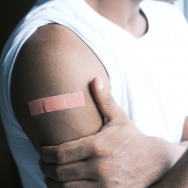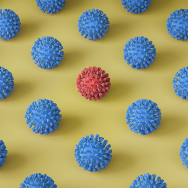A U.S. Food and Drug Administration advisory panel has recommended that the Pfizer-BioNTech COVID-19 vaccine be given to children who are 5 to 11 years old.
Once a panel from the Centers for Disease Control and Prevention gives an official go-ahead, doses will be widely available to young children across the Chicago area, including at the University of Chicago Medicine Comer Children’s Hospital.
Assoc. Prof. Allison Bartlett, a pediatrician at UChicago Medicine, answers common questions and tells you what you need to know about the COVID-19 vaccine for children—including when pharmaceutical manufacturers expect the vaccine to be available for those younger than 5, and how to help your child get ready.
Is the number of doses and timing for this vaccine different for this age group than for adults?
The number doses and timing between doses is the same for young children as it is for teenagers and adults. Like adults, this new group of vaccine-eligible children will need two shots, which will be given about three weeks apart. Children will have to wait two weeks after their second shot to be considered fully protected.
The biggest difference is that children who are 5 to 11 will receive a smaller dosage when they receive the immunization. Clinical studies showed that giving one-third of the adult dose (10 mcg for children, compared with 30 mcg for people 12 and up) led to the best balance of maximized immune response and minimized side effects.
Are the side effects the same for kids?
Yes, the range of side effects has proven to be similar to what has been seen in adults receiving the vaccine: soreness at the injection site, fatigue, chills, fever and headaches. Though the side effects are more pronounced after the second dosage, they have shown to last only a day or two.
Can children still get COVID-19 after being vaccinated?
No vaccination is 100% effective, so children could still get COVID-19 after being vaccinated. Like vaccinated adults, if children do become infected with COVID-19, they are much less likely to get severely ill. It's important to note that while severe illness among children who contract COVID-19 is rare, more data are needed to determine the longer-term physical, emotional and mental health impact of those who were infected as children.
Why can’t kids under 5 get the COVID-19 vaccine?
The current vaccines have not yet been authorized for children younger than 5. Studies are underway to test the safety and efficacy for children 6 months to 4 years old. Much like it took a while for the vaccines to be approved for elementary school aged children, the vaccine manufacturers are still conducting clinical research to establish the optimal dosage for the youngest group of the population. This is important so scientists can correctly balance the vaccine’s effectiveness and its side effects. Pfizer expects to have results from these studies later this year, with hopes of authorization to use this vaccine in the youngest kids in early 2022, if not sooner.
What is different about research methodologies when testing vaccines for children?
Because children are at different stages of development throughout childhood and adolescence, a number of factors are considered when testing safety and efficacy, such as the child’s weight and dosage tolerability. Manufacturers must figure out the dose that provides enough protection without too many side effects.
Can children also get the flu shot at the same time as the COVID-19 vaccine?
Both children and adults can absolutely get the COVID-19 vaccine at the same time as their annual flu shot. In fact, it’s something I strongly encourage with my patients, friends, and even my own children. The influenza vaccine is an important immunization that helps protect us from the seasonal flu and also helps minimize how sick we get if we are infected.
How can I help my child ease their anxiety about the COVID-19 vaccine?
The Child Life team at Comer Children’s Hospital has a lot of great experience helping kids prepare for medical treatments, including immunizations. Here’s some of their best tips:
- Calmly explain what’s going to happen to your child and why it’s important. Planning in advance helps kids mentally prepare and know they won’t be alone.
- Bring something fun and comforting like a tablet or a toy that can help distract a child and lower their anxiety. It’s also helpful to let children choose which item they want to bring with them, since it gives them a feeling of agency.
- Don't project your own fears or be dismissive of their concerns. Kids are great at picking up emotions from parents. If parents stay calm, it will help kids stay calm, too.
- Praise children afterward for doing a great job.
—Adapted from an article published by UChicago Medicine.

